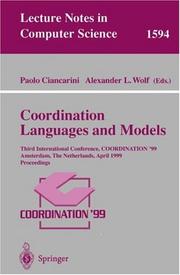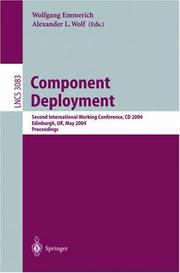| Listing 1 - 9 of 9 |
Sort by
|

ISBN: 354065836X 9783540658368 3540489193 Year: 1999 Volume: 1594 Publisher: Berlin ; Heidelberg : Springer,
Abstract | Keywords | Export | Availability | Bookmark
 Loading...
Loading...Choose an application
- Reference Manager
- EndNote
- RefWorks (Direct export to RefWorks)
We welcome you to Coordination ’99, the third in a series of conferences d- icated to an important perspective on the development of complex software systems. That perspective is shared by a growing community of researchers - terested in models, languages, and implementation techniques for coordination. The last decade has seen the emergence of a class of models and languages variously termed “coordination languages”, “con?guration languages”, “arc- tectural description languages”, and “agent-oriented programming languages”. Theseformalismsprovideacleanseparationbetweenindividualsoftwarecom- nents and their interaction within the overall software organization. This se- ration makes complex applications more tractable, supports global analysis,and enhances the reuse of software components. The proceedings of the previous two conferences on this topic were published by Springer as Lecture Notes in Computer Science 1061 and 1282. This issue of LNCS containing the papers presented at Coordination ’99 continues the tradition of carefully selected and high quality papers representing the state of the artin coordinationtechnology.In responseto thecallfor papers,wereceived 67 submissions, from which 26 papers were accepted. These proceedings also contain abstracts for posters presented at the conference. This year’s program features invited talks by Rocco De Nicola and Danny B. Lange. Reading through the papers, we expect that you may be surprised by the variety of disciplines within computer science that have embraced the notion of coordination. In fact, we expect this trend to continue, and hope that you will contribute to the on-going exploration of its strengths, weaknesses, and applications.
Parallel processing (Electronic computers) --- Electronic data processing --- Computer Science --- Engineering & Applied Sciences --- Distributed processing --- Computer science. --- Computer communication systems. --- Computer programming. --- Software engineering. --- Programming languages (Electronic computers). --- Operating systems (Computers). --- Computers. --- Computer Science. --- Programming Languages, Compilers, Interpreters. --- Operating Systems. --- Computer Communication Networks. --- Programming Techniques. --- Computation by Abstract Devices. --- Software Engineering. --- Computer software engineering --- Engineering --- Computer operating systems --- Computers --- Disk operating systems --- Systems software --- Informatics --- Science --- Operating systems --- Automatic computers --- Automatic data processors --- Computer hardware --- Computing machines (Computers) --- Electronic brains --- Electronic calculating-machines --- Electronic computers --- Hardware, Computer --- Computer systems --- Cybernetics --- Machine theory --- Calculators --- Cyberspace --- Electronic computer programming --- Electronic digital computers --- Programming (Electronic computers) --- Coding theory --- Communication systems, Computer --- Computer communication systems --- Data networks, Computer --- ECNs (Electronic communication networks) --- Electronic communication networks --- Networks, Computer --- Teleprocessing networks --- Data transmission systems --- Digital communications --- Electronic systems --- Information networks --- Telecommunication --- Cyberinfrastructure --- Network computers --- Computer languages --- Computer program languages --- Computer programming languages --- Machine language --- Languages, Artificial --- Programming --- Parallel processing (Electronic computers) - Congresses --- Electronic data processing - Distributed processing - Congresses
Book
ISBN: 364243603X 3642198228 3642198236 Year: 2011 Publisher: Berlin : Springer-Verlag,
Abstract | Keywords | Export | Availability | Bookmark
 Loading...
Loading...Choose an application
- Reference Manager
- EndNote
- RefWorks (Direct export to RefWorks)
Software engineering research can trace its roots to a few highly influential individuals. Among that select group is Leon J. Osterweil, who has been a major force in driving software engineering from its infancy to its modern reality. For more than three decades, Prof. Osterweil's work has fundamentally defined or significantly impacted major directions in software analysis, development tools and environments, and software process--all critical parts of software engineering as it is practiced today. His exceptional contributions to the field have been recognized with numerous awards and honors through his career, including the ACM SIGSOFT Outstanding Research Award, in recognition of his extensive and sustained research impact, and the ACM SIGSOFT Influential Educator Award, in recognition of his career-long achievements as an educator and mentor. In honor of Prof. Osterweil's profound accomplishments, this book was prepared for a special honorary event held during the 2011 International Conference on Software Engineering (ICSE). It contains some of his most important published works to date, together with several new articles written by leading authorities in the field, exploring the broad impact of his work in the past and how it will further impact software engineering research in the future. These papers, part of the core software engineering legacy and now available in one commented volume for the first time, are grouped into three sections: flow analysis for software dependability, the software lifecycle, and software process.
Engineering & Applied Sciences --- Computer Science --- Information Technology --- Software Engineering --- Software engineering. --- Osterweil, Leon J. --- Computer software engineering --- Computer science. --- Management information systems. --- Computer Science. --- Software Engineering. --- Management of Computing and Information Systems. --- Engineering --- Information Systems. --- Informatics --- Science --- Computer-based information systems --- EIS (Information systems) --- Executive information systems --- MIS (Information systems) --- Sociotechnical systems --- Information resources management --- Management --- Communication systems
Digital
ISBN: 9783642198236 Year: 2011 Publisher: Berlin Springer
Abstract | Keywords | Export | Availability | Bookmark
 Loading...
Loading...Choose an application
- Reference Manager
- EndNote
- RefWorks (Direct export to RefWorks)
Computer. Automation --- software engineering --- informatica management

ISBN: 128030765X 9786610307654 354024848X 3540220593 Year: 2004 Publisher: Berlin, Heidelberg : Springer Berlin Heidelberg : Imprint: Springer,
Abstract | Keywords | Export | Availability | Bookmark
 Loading...
Loading...Choose an application
- Reference Manager
- EndNote
- RefWorks (Direct export to RefWorks)
This volume of the Lecture Notes in Computer Science series contains the proceedings of the second Working Conference on Component Deployment, which took place May 20–21, 2004, at the e-Science Institute in Edinburgh, Scotland, as a collocated event of the International Conference on Software Engineering. Component deployment addresses what needs to be done afteracomponent has been developed. Component deployment includes activities such as com- nent customization, con?guration, integration, activation, de-activation and - commissioning. The emerging research community that investigates component deploymentconcernsitselfwiththeprinciples,methodsandtoolsfordeployment activities. The community held its ?rst working conference in Berlin, Germany, inJune2002.TheproceedingswerepublishedbySpringer-Verlagasvolume2370 of the Lecture Notes in Computer Science series. The program of this year’s conference consisted of an invited talk and 16 technical paper presentations. The invited talk was given by Patrick Goldsack of Hewlett PackardResearchLaboratoriesBristol, UK. He presented the Smart- Frog component deployment framework that HP released as Open Source. The technicalpaperswerecarefullyselectedfromatotalof34submittedpapers.Each paper was thoroughly peer reviewed by at least three members of the program committee and consensus on acceptance was achieved by means of an electronic PC meeting.
Computer science. --- Software engineering. --- Operating systems (Computers). --- Logic design. --- Computer Science. --- Software Engineering. --- Logics and Meanings of Programs. --- Programming Techniques. --- Programming Languages, Compilers, Interpreters. --- Operating Systems. --- Component software --- System design --- User interfaces (Computer systems) --- Engineering & Applied Sciences --- Computer Science --- Architecture, Computer. --- Computer programming. --- Programming languages (Electronic computers). --- Computer logic. --- Computer System Implementation. --- Computer software --- Computer network architectures. --- Design, Logic --- Design of logic systems --- Digital electronics --- Electronic circuit design --- Logic circuits --- Machine theory --- Switching theory --- Computer software engineering --- Engineering --- Computer operating systems --- Computers --- Disk operating systems --- Systems software --- Informatics --- Science --- Architectures, Computer network --- Network architectures, Computer --- Computer architecture --- Operating systems --- Architecture, Computer --- Computer languages --- Computer program languages --- Computer programming languages --- Machine language --- Electronic data processing --- Languages, Artificial --- Electronic computer programming --- Electronic digital computers --- Programming (Electronic computers) --- Coding theory --- Computer science logic --- Logic, Symbolic and mathematical --- Programming
Book
ISBN: 9783642198236 Year: 2011 Publisher: Berlin, Heidelberg Springer Berlin Heidelberg
Abstract | Keywords | Export | Availability | Bookmark
 Loading...
Loading...Choose an application
- Reference Manager
- EndNote
- RefWorks (Direct export to RefWorks)
Software engineering research can trace its roots to a few highly influential individuals. Among that select group is Leon J. Osterweil, who has been a major force in driving software engineering from its infancy to its modern reality. For more than three decades, Prof. Osterweil's work has fundamentally defined or significantly impacted major directions in software analysis, development tools and environments, and software process--all critical parts of software engineering as it is practiced today. His exceptional contributions to the field have been recognized with numerous awards and honors through his career, including the ACM SIGSOFT Outstanding Research Award, in recognition of his extensive and sustained research impact, and the ACM SIGSOFT Influential Educator Award, in recognition of his career-long achievements as an educator and mentor. In honor of Prof. Osterweil's profound accomplishments, this book was prepared for a special honorary event held during the 2011 International Conference on Software Engineering (ICSE). It contains some of his most important published works to date, together with several new articles written by leading authorities in the field, exploring the broad impact of his work in the past and how it will further impact software engineering research in the future. These papers, part of the core software engineering legacy and now available in one commented volume for the first time, are grouped into three sections: flow analysis for software dependability, the software lifecycle, and software process.
Computer. Automation --- software engineering --- informatica management
Book
ISBN: 0769528295 9780769528298 1509088369 Year: 2007 Publisher: [Place of publication not identified] IEEE Computer Society
Abstract | Keywords | Export | Availability | Bookmark
 Loading...
Loading...Choose an application
- Reference Manager
- EndNote
- RefWorks (Direct export to RefWorks)
Software engineering --- Engineering & Applied Sciences --- Computer Science --- 681.3*D2 <063> --- Software engineering: protection mechanisms; standards--See also {681.3*K63}; {681.3*K51}--Congressen --- 681.3*D2 <063> Software engineering: protection mechanisms; standards--See also {681.3*K63}; {681.3*K51}--Congressen
Book
Year: 2000 Publisher: [Place of publication not identified] ACM
Abstract | Keywords | Export | Availability | Bookmark
 Loading...
Loading...Choose an application
- Reference Manager
- EndNote
- RefWorks (Direct export to RefWorks)
Book
Year: 2000 Publisher: [Place of publication not identified] ACM
Abstract | Keywords | Export | Availability | Bookmark
 Loading...
Loading...Choose an application
- Reference Manager
- EndNote
- RefWorks (Direct export to RefWorks)
Book
Year: 2007 Publisher: [Place of publication not identified] ACM
Abstract | Keywords | Export | Availability | Bookmark
 Loading...
Loading...Choose an application
- Reference Manager
- EndNote
- RefWorks (Direct export to RefWorks)
| Listing 1 - 9 of 9 |
Sort by
|

 Search
Search Feedback
Feedback About UniCat
About UniCat  Help
Help News
News